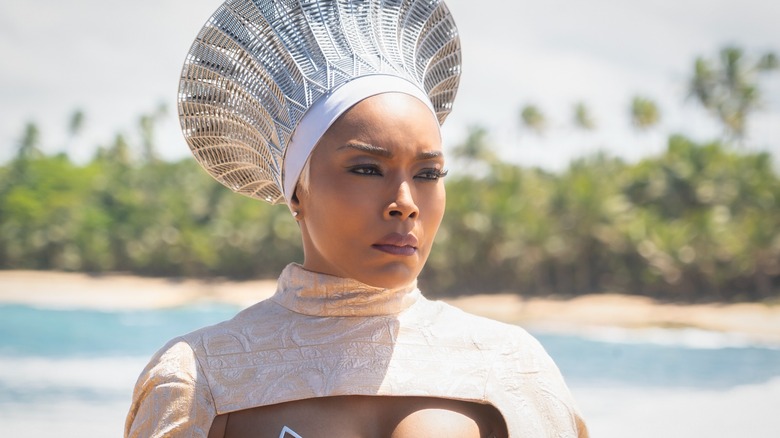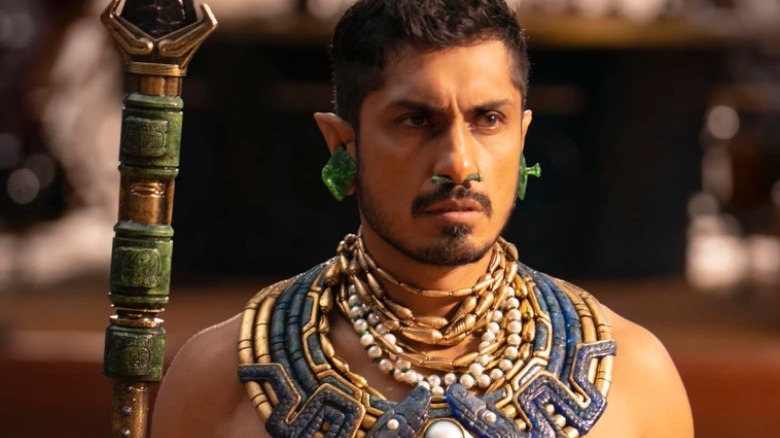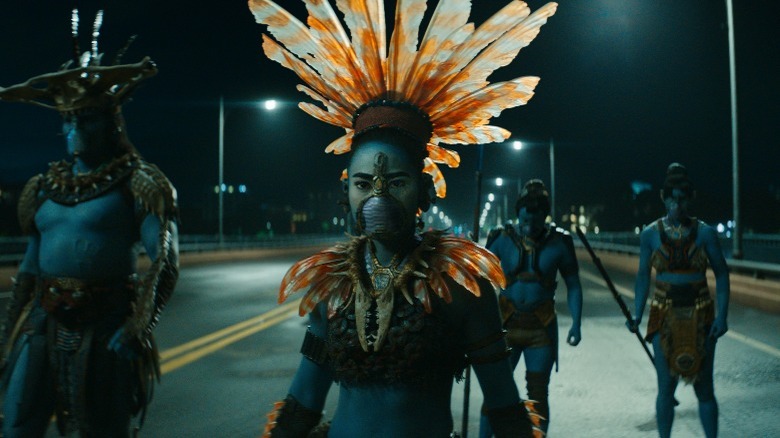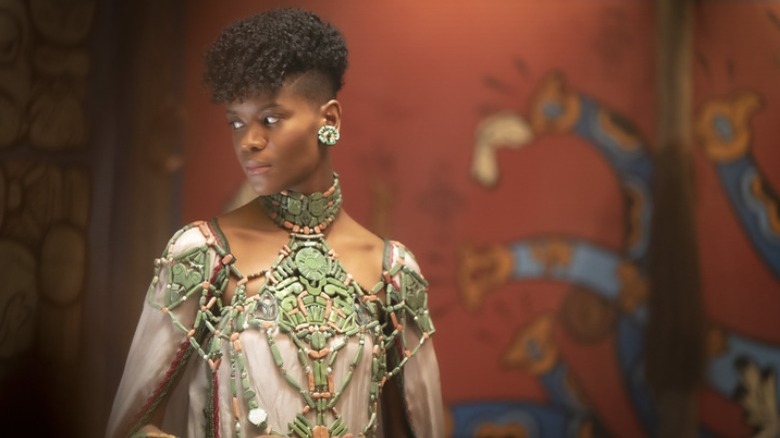
"Black Panther: Wakanda Forever" may not turn out to be the best Marvel movie of all time, but it certainly features one of the best soundtracks the Marvel Cinematic Universe has ever put together. The movie that got Rihanna out of retirement has a stellar soundtrack that also features an array of talented musicians, including several Nigerian and Mexican artists who bring the sounds of the cultures that inspired the movie to life. Plus, the film has something that gives it a leg up on 2018's "Black Panther," its only real competition in the running for best MCU soundtrack to date: an extremely distinctive and excellent score that mirrors the film's compilation soundtrack.
When it comes to the quality of their soundtracks, movies in the Marvel Cinematic Universe can pretty much be divided into two categories: scores made with the guidance of super-talented composer Ludwig Göransson, and scores made without him. Sure, there are actually only two films in the former category, but they're in a league of their own. The musician rightfully won an Oscar for the 2018 "Black Panther" score, but personally, I think this one's even better.
The Movie Has Great Soundtrack And Score Crossover

I was disappointed in the music of "Black Panther" upon first watch, frustrated that so many of its great original songs were left out of the actual movie. After all, the soundtrack itself included new music from artists like Kendrick Lamar, Vince Staples, SZA, and The Weeknd. But Marvel movies seem allergic to more than a couple of needle drops per film, so aside from a few memorable moments, audiences were left with the score alone. Plus, the "Black Panther" score is distinctive, but it also can't help but heavily feature the typical swelling, cinematic beats that signify generic Marvel heroism.
"Black Panther: Wakanda Forever" has no such problem. Much of its uniqueness comes from the fact that Göransson and fellow artists crafted "film versions" of the songs from the soundtrack to play in the movie. This means that even if we don't hear the full version of Rihanna's "Lift Me Up," Toby and Fat Nwigwe's "They Want It, But No," or Göransson and Foudeqush's "Con La Brisa" before the credits roll, we hear a score version that still incorporates most of the elements of their songs.
This creates a liveliness and energy to the soundtrack that audiences hear in the film, one that's usually only captured when listening to the full album afterward. Göransson and writer, director, and soundtrack producer Ryan Coogler make sure not to leave all the best stuff for the compilation, but weave it throughout the movie instead. This was apparently extremely deliberate. In an interview with /Film's Vanessa Armstrong, Göransson says that he purposely cross-pollinated the two projects, explaining, "Normally, it's two different departments doing two different jobs, but here, I worked with the artists and I worked with the instrumentalists for the score in a seamless process."
From Music Archaeologists To Rihanna

Göransson got creative in other ways, too. He says he wanted to incorporate Mayan music after finding out that Coogler's take on the character Namor (Tenoch Huerta) was heavily inspired by the Mesoamerican culture.
"I didn't know that much about that culture and that music, and obviously, we all know that it was erased, that it was forcibly erased hundreds of years ago," he said while speaking to /Film. In an impressive commitment to the film's vision, the composer ended up working with music archaeologists who had studied instruments found in Mayan peoples' graves and discovered that they used seashells, turtle shells, clay flutes, and "shakers that sound like snakes" to craft music. His research informed the playful, intriguing, and just straight-up cool-sounding score that accompanies the Talokans in the film.
The movie's compilation soundtrack is also already receiving plenty of attention for featuring artists like Stormzy, E-40, Tems, and of course, Rihanna. The latter artist hadn't dropped new music in five years, and her ballad "Lift Me Up" carries the most emotional moment of the film. It's a gorgeous, resonant song that will forever be linked to audiences' feelings about the late, great Chadwick Boseman, and Coogler says Rihanna joined the project in honor of the actor. In a press conference, he explained that the singer put down two tracks for the Roc Nation, Def Jam, and Hollywood Records-produced album because of Boseman, saying: "The truth is, once she played us the record, she said straight-up, 'I did this for Chad.' So it was him, man."
An Emotional Journey Through Music

Love for the late actor is even woven into the score itself. Göransson tells ScreenRant he purposely moved away from the sound of T'Challa's talking drum and created a theme for Shuri (Letitia Wright) with a vocalist named Georgia Smith. The theme develops over the movie, ultimately becoming something epic that intertwines with the Black Panther's original theme. "They work together and are connected," Göransson shares. "That journey was very important to get right musically."
The result of all of this creativity is one of the most powerful and striking soundtracks in MCU history. The "Black Panther: Wakanda Forever" soundtrack pays tribute to the cultures that inspired the film and the artist whose tragic absence defines it, but it's also the rare superhero movie soundtrack that simply sounds phenomenal, both on-screen and off.
Read this next: The Most Powerful X-Men Characters Ranked
The post Black Panther: Wakanda Forever's Soundtrack Puts the Rest of the MCU to Shame appeared first on /Film.
0 Comments